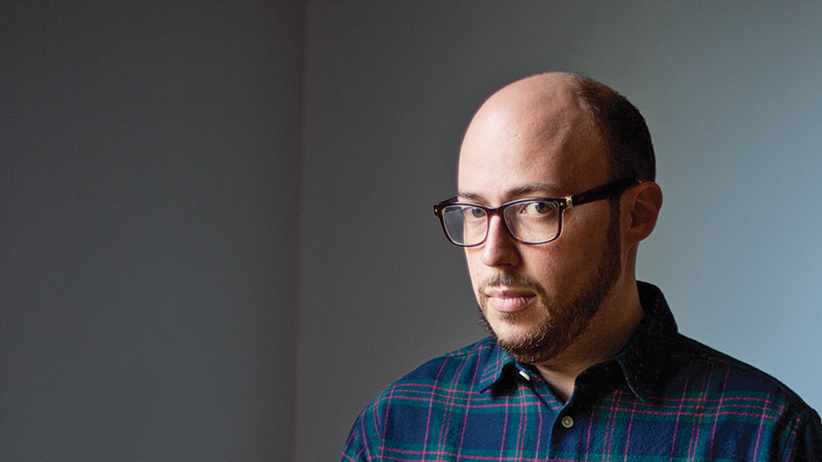Sean Michaels is the 2014 Scotia Bank Giller Prize winner for his book, Us Conductors about Léon Theremin, the inventor of the first electronic instrument. He’s a music critic and father of Said The Gramophone, an mp3 blog launched in 2003. The AQ’s Dylan Hackett spoke with him about music and writing.

How does music journalism influence your creative writing?
It’s funny, I’ve always wanted to be a fiction writer. It’s how I set out into the world from my teens on. It’s from the perspective or dream of writing fiction that I stumbled backwards into music writing. It feels like I’m on the other side of the looking glass. I’m known for being a music critic and my music writing has been strongly influenced by my fiction writing.
What music strikes inspiration in you when you’re working on a piece of writing? Or in this case, Us Conductors?
I don’t think I have an anthem but I am listening to music all the time — its funny in the first draft of Us Conductors, the opening lines was “Why don’t we have stories that feel like songs?” That’s not quite true that we don’t, but there was something nice about making his tone and what his character was trying to do. He was trying to sing a love song in the form of a letter. So I spent a lot of time listening to old love songs.
I was writing passages about the performances about old classical music pieces, so I listened to Clara Rockmore, period jazz, Gershwin, and I listened to contemporary music to give me the certain excitement, or contemporary relevance in the book. And I remember listening to Tim Hecker, a lot of that too.
But, the secret sound track of the book was post-punk in the 1980s, Kate Bush New Order stuff. The chapter titles of the book are quiet nods to songs from that era even though it takes place in the ‘20s and ‘30s.
How do you, or, did you manage to transcribe music onto paper? How difficult is the process for you—both within your book and in your blog?
[When listening to music,] every one listens and hears something magical. Even when you were standing at a concert you’re around strangers but your all feelings are slightly different. There are different imaginations telling different stories and we don’t talk about memories. I think it’s a beautiful and interesting space to talk about music. It sounds silly, but its important to find different ways to talk about how it appears shapes and affects us.
How did Said The Gramophone, if it did, prepare you for Us Conductors?
I think that one of the interesting things to me, and in writing about music is what happens at the intersection of the music maker and the music listener. When we write about music we do it in one of two ways: either very much focused on the performer what they’re up to or the performer in the studio, or you talk about it in a socio-historic perspective and how society receives that music.
And music can remind us that good writing says a little bit too little. It doesn’t fill in absolutely everything. Billy Bragg has a weird track Walk Away Renee — it’s an amazing little short story. He gets it, that there needs to be empty space and gaps and unanswered questions in music and writing.
What are your ties to Atlantic Canadian music? What stands out to you about music that comes from here?
Well I have strong ties to Sappy Fest. Their programming always mirrored my tastes.
I listened to a lot of classical music growing up and folk music, especially British folk music. I remember in recent years I’m more of an indie rock guy and that breakthrough was hearing Much East. They played Sloan’s song Everything You’ve Done Wrong and a track by Cool Blue Halo, I can’t remember the name of it, they were a relatively short lived band a mid-nineties. That song in some way blew open this idea that there’s this amazing music being made by someone who isn’t already famous
So there’s this shambling, approachable, messy sincerity of East coast music and there’s also something about the melodies of East coast music.
Any bands in particular you’re a big fan of?
Nap Eyes are a great example of East coast music. As of lately, let’s see, the whole Sappy Fest axis, Julie Doiron, Baby Eagle, Monomyth and Alvvays used to be out there, they’re great.
What are you doing now? Is there anything you’re doing to prepare for your next book?
As I think about the coming weeks, I want to carve out enough space to read books and listen to music to refill my creative well. Right now I’m still in the very early stages of thinking about another book. It’ll be something contemporary that takes place here in Montréal. I’m listening to the sounds and the stories and the city that are around me.
My friend Jeff Miller has written a zine, Ghost Pine, and is living in Nova Scotia now. His new issues came in the mail and they’re true stories from his life — there’s just so much inspiration in that little book, there’s so much beautiful truth and hilarious art in there. All you need to do is make something—and I am reminding myself of that.
Michaels will be in Fredericton in January for the fourth installment of Shivering Songs.
